Quito, Ecuador – He was elected president at a time of crisis, as Ecuador’s murder rate skyrocketed and gang violence seeped across the country.
Now, Ecuadorian leader Daniel Noboa is taking a plan of action to the voters, with an 11-part referendum on Sunday.
The referendum includes a wide range of proposals, from the militarisation of Ecuador’s police to tougher punishments for crimes like drug trafficking, murder and money laundering.
But Sunday’s vote is set to go beyond beefed-up security practices. One question, for example, aims to reform the judiciary system. Another considers whether arbitration should be the default approach to settling international financial disputes.
Noboa has been pushing for Ecuadorians to vote in favour of all 11 ballot measures, in an effort to streamline the economy and stamp out gang violence.
“Voting yes will strengthen our laws and leave no opportunities for those criminals who wish to joke with our justice [system] with the help of corrupt lawmen,” Noboa said in a public event on Monday.
But the broad nature of the proposals has prompted concern, with critics wondering what the consequences could be for human rights, the economy and efforts to stabilise Ecuador’s security situation.
Some have even questioned whether the referendum reflects a shift towards the “mano dura” or “iron fist” policies popular in countries like El Salvador, where human rights organisations have warned of false imprisonment and a lack of due process.
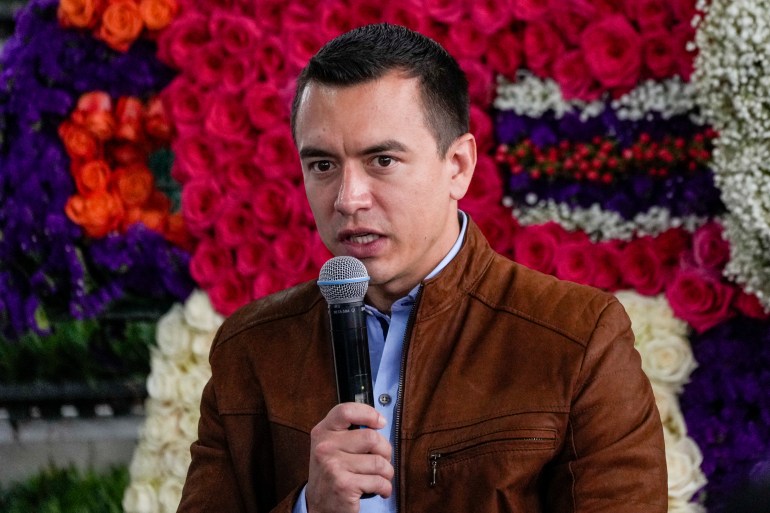
Limited opposition
Still, only one major political group in the country has consistently called for Ecuadorians to vote “no” on all 11 ballot measures: the Confederation of Indigenous Nationalities of Ecuador (CONAIE).
The group has accused the government of exploiting the referendum to further Noboa’s political ambitions, as the country approaches its 2025 general election.
Noboa — a 36-year-old politician and heir to a banana industry fortune — was sworn in last November to serve an abbreviated 18-month term, after the departure of embattled President Guillermo Lasso. But he is widely expected to run for a full term in the next race.
In a virtual forum on April 11, CONAIE president Leonidas Iza called the referendum a chance for Noboa to rally support.
“The government needs to consolidate its strength to impose neoliberal policies,” Iza said.
Referendums, he added, are costly to organise, and he called for the policies to instead be considered in Ecuador’s National Assembly.
Another CONAIE leader, Agustin Cachipuendo, was later quoted in the newspaper El Universo as saying any repercussions from the vote would disproportionately fall on marginalised groups.
“This government does not know poverty [but] makes decisions that affect the poor,” he said.
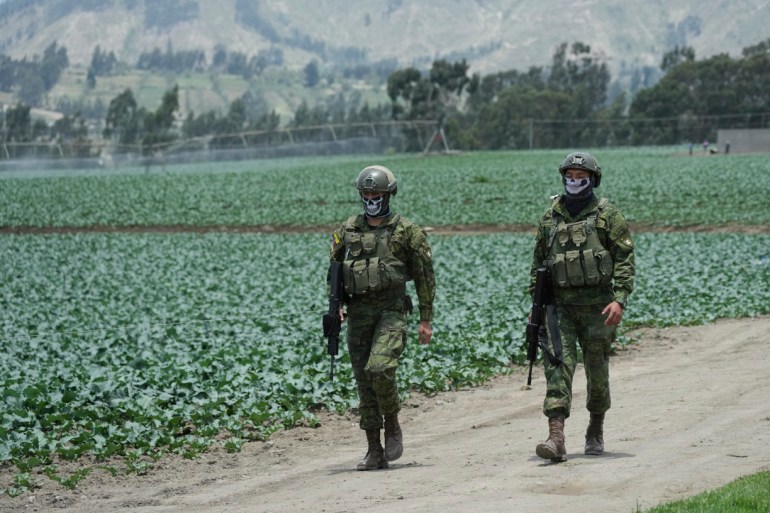
Rallying public support
Nevertheless, the referendum enjoys relatively broad public support. According to the research institute Comunicaliza, 42.7 percent of voters plan to back Noboa’s proposals.
Still, another 27.5 percent said they have not made up their minds yet.
Maria, a 48-year-old resident of Guayaquil who asked to use a pseudonym for her safety, is among those supporting the president’s measures to tighten security in the country.
Her city has been at the forefront of the crisis. In January, for instance, a criminal group stormed a local TV station during a live broadcast and held employees at gunpoint, generating international outcry.
Maria explained she had been targeted by a criminal group herself: They blackmailed her by threatening her children. But she said she feels safer thanks to the state of emergency Noboa imposed in January, which allowed the military to be deployed to city streets.
“Policemen and soldiers have been patrolling the borough in these months, so we can finally sleep tight at night,” Maria told Al Jazeera.
She credits the soldiers with curbing the violence in her neighbourhood. The referendum could pave the way for the military to have a permanent role in policing, something Maria hopes will happen.
“If they will leave us, what happens then? This is what everyone is worried about,” she said.

Searching for a permanent fix
Noboa’s government has argued that the referendum is a necessary step to curb the wave of violence that has rattled the country since 2018.
Declaring a state of emergency, officials argue, is only a temporary solution.
“The general purpose of the [referendum] is to establish some permanent mechanisms, breaking the cycle of enacting emergency decrees and then going back to business as usual,” said the government spokesperson Roberto Izurieta in an interview with local television station Teleamazonas.
The state of emergency granted the government additional powers, allowing officials to impose a curfew and take stronger action against gangs.
Under the state of emergency, for instance, Noboa’s government labelled 22 criminal groups as “terrorist” organisations, clearing the way for the police and military to focus extra resources towards combatting them.
Security forces also seized 77 tonnes of drugs and detained 18,736 people, 300 of whom have since been accused of terrorism. According to the authorities, violent deaths have reduced by 26 percent since Noboa took office.
But in early April, the state of emergency came to an end. Ferdinando Carrion, a security expert, believes some of the reforms in the referendum could help Noboa to continue his campaign against the violence, but more structural reforms are needed.
“They achieved good results in the first two months,” Carrion said of the government’s state of emergency. “But it looks like the effect has been exhausted.”
He pointed to Ecuador’s prison system as a particular area of vulnerability. Investigations have shown that criminal organisations use prisons as spaces through which they can run their operations.
But under the state of emergency, the military was allowed to intervene. Carrion said that produced positive results.
“They intervened in 18 prisons out of 36, managing to sever [the gang leaders’] relations with the outside,” Carrion explained.
“But the minute the army leaves the prisons and gives them back to the national service SNAI, they will return to business as usual, since it has shown problems of efficiency, corruption and collusion.”
Carrion would like to see even greater reforms to government agencies like SNAI, beyond what is on the ballot on Sunday.
“Strengthening our institutions is paramount,” he told Al Jazeera, calling for the creation of a new body to replace SNAI.
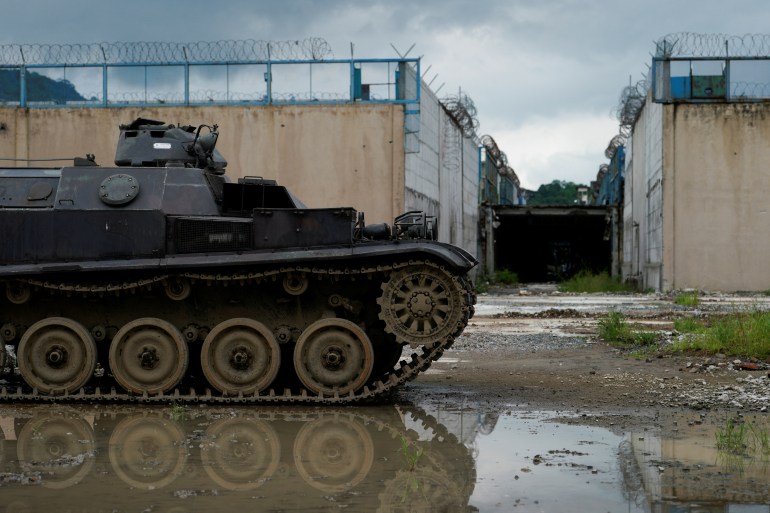
Elections in the crosshairs
Still, some analysts question the efficacy of the referendum, even if it is successful.
Carla Alvarez, a professor studying security at the National Institute for Higher Studies, believes that the referendum will fall short of addressing the country’s gang crisis.
“No query made for public consultation will damage the structure of criminal organisations,” she told Al Jazeera.
She echoed concerns that the referendum has done more to bolster Noboa’s public image than to address the roots of crime in Ecuador.
Many experts trace the rise in the violence to Ecuador’s strategic location between the two largest cocaine producers in the world, Colombia and Peru.
They also point out that Ecuador’s economy was significantly weakened during the COVID-19 pandemic, leaving unemployed youth vulnerable to gang recruitment.
But Alvarez said Noboa’s emphasis on holding the referendum is also motivated by his future ambitions. “This vote is happening in the middle of an electoral race. And this allows the president to revive his image on social media and achieve more visibility.”
The security situation has a direct impact on the integrity of Ecuador’s democracy. In the lead-up to the snap election last August, a presidential candidate running on an anticorruption platform was gunned down outside of a rally.
And in recent months, politicians have continued to be targets of the spike in violence.
Five mayors have been shot dead since the year began, the most recent murder unfolding on Friday, just days before Sunday’s vote.
The slain mayor, Jorge Maldonado of Portovelo, was the third to be killed in less than a month. His death followed that of Mayor Brigitte Garcia of San Vicente and Mayor Jose Sanchez of Camilo Ponce Enriquez.
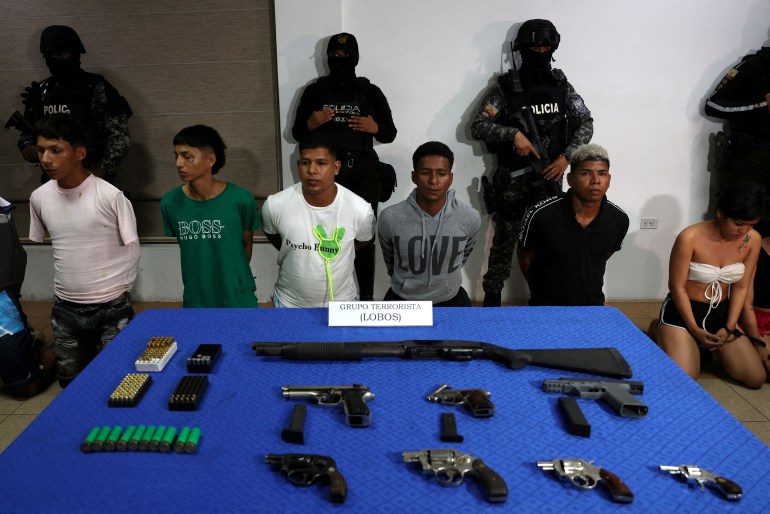
Chance of a split vote
Critics like Alvarez underscore that referendums are no silver bullet to the security crisis.
Rather, they are a relatively common political tool. Since 2006, Ecuadorians have been asked to express their will through referendums nine times, on issues ranging from oil exploration to presidential term limits.
Paulina Recalde, director of pollster Perfiles de Opinion, also questions whether Sunday’s referendum will create the groundswell of support Noboa seeks.
While Noboa is angling for approval on all 11 items, Recalde’s research suggests that voters will not unanimously back all the proposals.
“Since the very beginning, we never found an overall majority. People won’t vote the same in all the 11 queries,” she said.
Recalde also said there was confusion over the vote. According to her research, 68 percent of respondents knew little or nothing about the referendum a month ago.
She added that the power outages Ecuador is currently experiencing — as well as a controversial police raid on Mexico’s embassy in Quito — could dent Noboa’s popularity, regardless of the vote’s outcome.
“If people vote yes to expand the role of the military, does it mean that they are providing strong support for the president? I would say no,” she said.
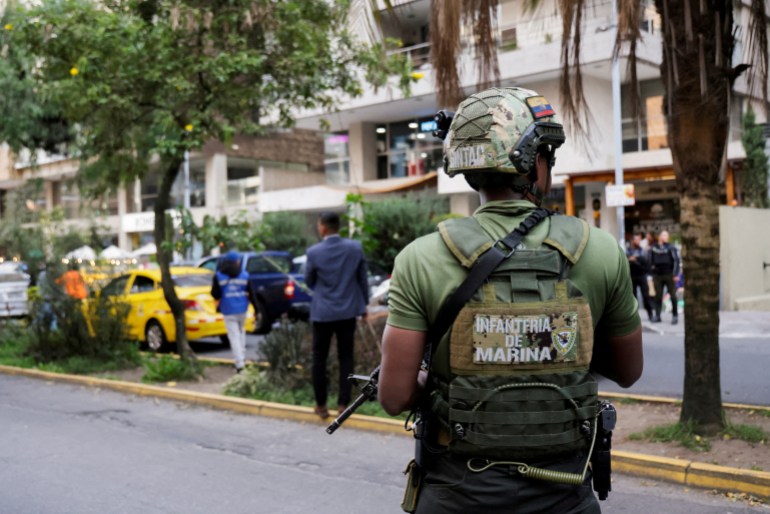
Arbitration on the ballot
One of the most controversial ballot measures in Sunday’s referendum asks Ecuadorians to implement a system of “international arbitration” to resolve conflicts between the state and private foreign investors.
In international arbitration, a third neutral party is used to reach a binding decision that settles any claims.
Supporters of the measure feel arbitration could safeguard foreign investment in Ecuador, thereby boosting the country’s economy.
“In a dollarised economy like Ecuador, we need an increase in strong direct foreign investments aligned with our public policies,” said Eric Vinueza, investment counsellor for the Corporation for the Promotion of Exports and Investments (Corpei) who supports the measure.
But activists have criticised this proposal as a tool to discourage the government from enacting environmental reforms that might disadvantage foreign mining interests and other overseas companies.
With arbitration, foreign investors could file complaints and negotiate settlements behind closed doors, leaving the public no recourse to appeal.
“These are private and unilateral judicial spaces which allow transnational companies to sue the states, where the states are only able to defend themselves,” said Ivonne Ramos, a mining expert at the NGO Accion Ecologica.
In the 2008 constitution, Ecuador prohibited any international agreement that would limit its national sovereignty, including through international arbitration.
Sunday’s referendum would undo that protection. Ramos added that international arbitration could come with steep expenses for taxpayers.
Ecuador already owes $2.9 trillion to foreign companies. It is currently involved in 29 different lawsuits before international tribunals, with half of the complaints related to mining and fossil fuels.
“Three of the eight pending procedures could cost more than another $10 trillion, which is our national budget for education and health for 2024,” Ramos said.

